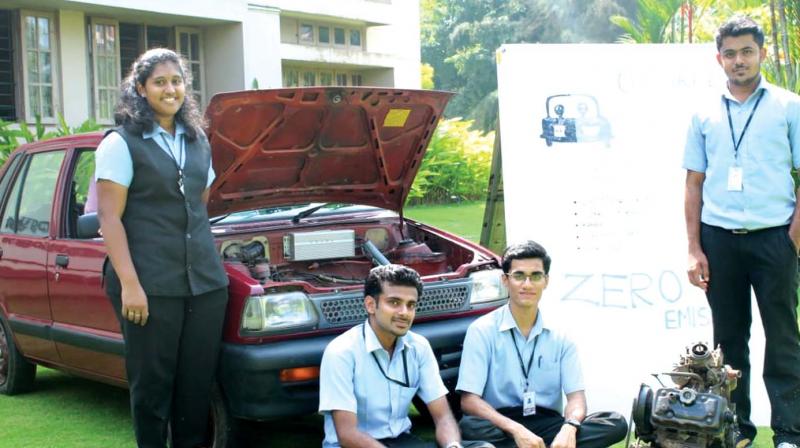Kozhikode: Now, e-car controlled with mind-reading sensor

Kozhikode: Green Folks, a six-member team of innovators at Rajagiri School of Engineering and Technology, Kochi, has developed an electric car controlled with a mind- reading sensor.
The car built on 'telepresence' technology can be run through a mobile app with a virtual driver.
Jeffin Francis Chakkalakal, Jeswant Mathew, Anupama Johnson, Aby Biju, Alan Jones, and Jegil Jerson began working on it in September 2017. Within two months, they converted an ordinary Maruti 800 into a semi-autonomous EV.
"I was always an admirer of James Bond movies, in which they follow the concept of a virtual driver. I wanted to bring that into reality," said Mr Chakkalakkal.
"We launched the semi-autonomous vehicle in December 2017 and completed the installation of the brain-control system in January 2019."
The latest technology installed on this awe-inspiring car is the live stream driving using VR (Virtual Reality) device.
"We can control the car over the internet using camera streaming in the car from a remote location anywhere in the world like a virtual driver," he said.
"This technology is called 'telepresence'. We use real-time streaming protocol for the video and audio streaming. The car control commands are transmitted through the internet.
The only disadvantage is the internet speed and availability."
The car is charged through both solar and electric power sources. It takes around 3-4 hours and runs up to 60 km with a maximum speed of 60-70 km/h. A better motor can
increase speed.
"We can set up a solar panel above the car if required. But I think it's foolishness," he said.
"The battery will not be charged constantly while the car is moving, which gradually affects the battery life. It's always advised to charge continuously rather than charging
intermittently. And it's risky as solar panels are brittle and delicate."
A mind-reading EEG (electroencephalography) headset on the car produces different waves according to our thoughts. It is a biomedical sensor. It reads our command.
The hardware system set up in the car detects the command and process the vehicle accordingly. The system has been trained to act according to brain waves.
The sensor works continuously for around six hours.
"If we sleep while driving, the sensor detects the brain waves, and the vehicle stops immediately. This helps avoid accidents," said Mr Mathew.
The car starts with fingerprint technology, which is not possible in petrol or diesel vehicles. Alternately, one can use patterns on the screen.
The total project cost was around Rs 4 lakh, out of which Kerala Startup Mission gave Rs 2 lakh.
The team was guided by vice-principal Dr John M. George, who is also the dean and assistant professor.
"An excellent project, but the safety features have to improve to get permission to bring it on the road," said Vishu Sanker, a student from the college.
Dr V. Sajith, an automobile engineering expert at the National Institute of Technology, Calicut, said: "We have tried brain-controlled wheelchairs here. This is an extreme version of
it. The novelty here is the mind-reading sensor.
It has to be trained to capture the signals, which they have done exquisitely. The other highlight of the project is the 'solar charging', which is non-polluting."
Dr A.P. Sudheer, also of NITC, feels there would be some difficulties in implementing the mind-reading sensor in real-time.
"Data of thousands of people should be taken and attached with the intelligence system," he said.
"The technology is possible, but can be implemented only with high-end sensors and intelligent systems."

